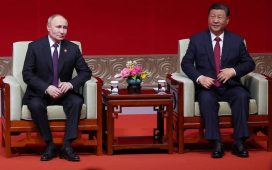Unlock the Editor’s Digest for free
Roula Khalaf, Editor of the FT, selects her favourite stories in this weekly newsletter.
Peloton chief executive Barry McCarthy is stepping down from his role as the exercise-bike maker launches a restructuring plan that will cut 15 per cent of its workforce.
The former Netflix and Spotify executive had succeeded former CEO and founder John Foley in 2022. McCarthy, who was lured out of retirement with a pay package initially valued at $168mn, was tasked with turning around the connected-fitness company after it had burnt through cash, leaving it “thinly capitalised” for its size.
Peloton’s share price never regained its pandemic-era highs, leaving the equity awards that made up most of McCarthy’s pay package worth a fraction of its initial valuation. Just months into his role as chief executive, McCarthy faced pressure from activist investors over corporate governance.
Despite a series of earlier lay-offs and cost cuts in recent years, Peloton’s market capitalisation has fallen to less than $1.5bn from an early-2021 peak of almost $50bn. The group was valued at $8.1bn at the time of its initial public offering in September 2019.
The New York-based company saw sales surge during Covid-19 lockdowns, but it subsequently struggled as easing pandemic restrictions allowed people to resume in-person activities at gyms and fitness studios.
Those downward trends have continued. In its quarterly results on Thursday, Peloton reported that total revenue in the three months to March fell 4 per cent from a year ago to $717.7mn. Sales of its connected fitness products sank 14 per cent, in a sign of soft demand for its bikes and treadmills.
Subscription revenue, which now represents 61 per cent of total revenue, increased 3 per cent in its fiscal third quarter from a year ago, but the results showed signs that customer engagement is flagging. The number of paid app subscriptions plunged 21 per cent from the same period last year.
Peloton’s net loss narrowed to $167mn in the third quarter, but still missed analysts’ expectations for a loss of $130mn. The company said it generated positive cash flow for the first time in more than three years, of $8.6mn, a reversal from cash burn of $55.3mn in the same quarter a year earlier.
The company said generating “sustained and meaningful” positive free cash flow was a “top priority”, and announced on Thursday plans to cut about 400 jobs and continue reducing its retail showroom footprint in an effort to reduce costs.
Peloton said the plan would result in annual cost savings of more than $200mn by the end of its 2025 fiscal year.
Group chair Karen Boone and company director Chris Bruzzo will be interim co-chief executives until the company has found a permanent replacement for McCarthy, who will become a strategic adviser to Peloton until the end of the year.
“Barry joined Peloton during an incredibly challenging time for the business,” Bruzzo said in a statement, crediting him with “rearchitecting the cost structure of the business to create stability and to reach the important milestone of achieving positive free cash flow.”
Peloton shares jumped more than 15 per cent right after Wall Street’s opening bell on Thursday.




